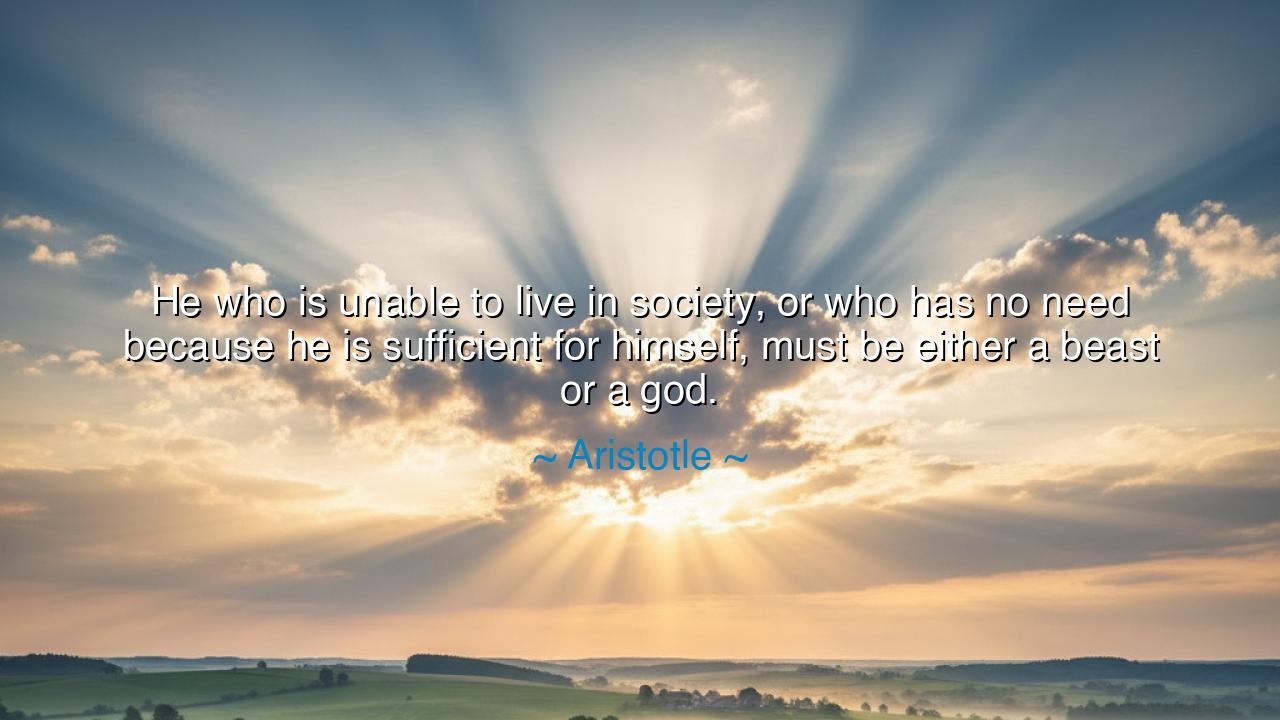
He who is unable to live in society, or who has no need because
He who is unable to live in society, or who has no need because he is sufficient for himself, must be either a beast or a god.






In the great city-states of the ancient world, where society and community were revered above all, the wisdom of Aristotle guided many in understanding what it meant to be truly human. He said, “He who is unable to live in society, or who has no need because he is sufficient for himself, must be either a beast or a god.” These words are not just an observation, but a profound reflection on the very nature of human existence, the delicate balance between individuality and community, and the question of what it truly means to be part of the human race.
The essence of Aristotle’s statement lies in his understanding of humanity. He believed that humans are inherently social beings, that to live outside of society was to be disconnected from the very core of what makes us human. The Greek philosopher held that we, unlike the beast, possess the ability to reason, to communicate, and to create bonds that transcend mere survival. For Aristotle, the individual who cannot live in society, who has no need for the company of others, is missing a fundamental part of the human experience. Such a person, by nature, must either be less than human—like a beast, driven by instinct rather than reason—or something greater—like a god, whose self-sufficiency places them above the mortal world.
In this view, society is not just a gathering of people, but the very ground upon which human flourishing occurs. The human being is not meant to live in isolation, for it is only within society that we can develop our virtues, our wisdom, and our capacity for love. Aristotle believed that the political community, the polis, was essential for the expression of the highest ideals of humanity. Without society, the individual cannot reach the full potential of their nature, and therefore, they are incomplete.
Consider the ancient Spartans, who, while revered for their military prowess, lived in a highly organized and rigid society where the individual was always secondary to the collective good. Their emphasis on discipline and duty to the state formed the foundation of their identity. To live outside of this system, to reject the community, would have been a rejection of their very humanity—for they believed that to be human was to serve the greater good. The warrior, who dedicated himself to his people, became the ideal of Spartan society, for he found meaning not in isolation, but in the shared purpose of his comrades.
Now, consider the figure of Diogenes, the ancient philosopher known for his rejection of societal norms and his embrace of self-sufficiency. Diogenes famously lived in a barrel, rejecting the comforts and luxuries of society in pursuit of simplicity and self-reliance. In his case, we see the embodiment of Aristotle’s concept of the individual who is sufficient for himself. Diogenes, however, did not reach the status of god but was seen by many as something closer to a beast—a figure who had abandoned society to live in the wild, disconnected from human connections and social obligations. In his life, we see the danger of complete isolation from society: it led not to divine enlightenment but to a form of dehumanization.
Yet, even in self-sufficiency, there is the potential for greatness. Socrates himself was known for his self-sufficiency and yet remained deeply connected to society through his dialogues and teachings. He sought not to live in isolation but to challenge the moral and intellectual fabric of society, questioning its laws and virtues. Unlike Diogenes, Socrates was not separated from his fellow humans but engaged with them in the most profound of ways. His self-sufficiency was not a rejection of society but a means to transcend its limitations, seeking wisdom and truth for the betterment of all.
The lesson Aristotle offers is one of balance. To live outside of society is to risk becoming dehumanized. To be self-sufficient is noble when it serves to elevate the individual’s intellect and spirit, but it must not come at the cost of rejecting the very thing that makes us human: our connection to others. A truly great individual is one who finds a way to both live within society and retain their self-sufficiency, understanding that the two are not mutually exclusive. True greatness is found not in solitude, nor in dependence, but in the harmony between the two.
In our own time, as we face the challenges of modernity, Aristotle’s wisdom speaks to us with great clarity. We are often tempted to isolate ourselves, to build lives of self-reliance in the midst of a world that feels fragmented and disconnected. But we must not forget that it is through our connections with others, through shared purpose, and through a deep sense of community that we find our true humanity. Let us embrace the challenge of balancing self-sufficiency with engagement in the world around us, so that we can live lives of both meaning and purpose, enriched by the society we help build. Only then can we truly embody the highest potential of the human spirit.






AAdministratorAdministrator
Welcome, honored guests. Please leave a comment, we will respond soon